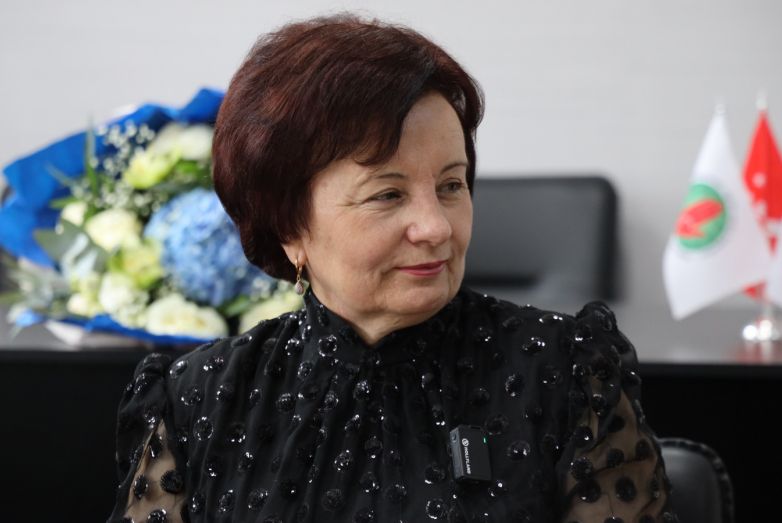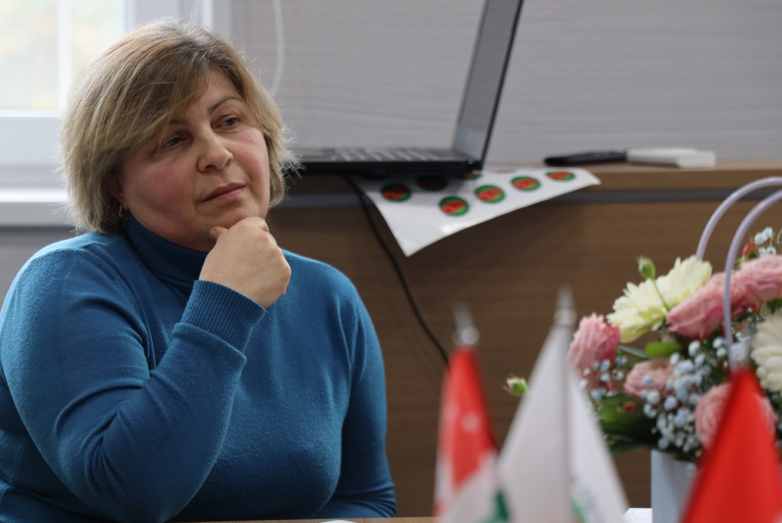The Council of Women of Abkhazia at the World Abaza Congress held its first meeting in 2024. The meeting took place in the Sukhum office of the Congress.
Shazina Bganba
Three main items were put on the agenda: projects and tasks of the Women’s Coordination Council in 2024, the opening of local representative offices of the WAC women’s councils in the regions and settlements of Abkhazia, the exchange of experience and opinions in the field of teaching apsuara.
The round table was moderated by Ekaterina Bebia, Chairman of the Women's Council of the WAC. Teachers of Pitsunda Secondary School No. 1 Dona Malia and Aida Trapsh, director of the State Museum of PWPA named after Sergey Dbar in Gudauta Gugutsa Dzhikirba, director of Gudauta Television Larisa Chanba, teacher of Gudauta Secondary School No. 5 Kama Butba, head of Ochamchira Secondary School No. 4 Lyalya Papaskir, teacher of Ochamchira Boarding School Lorena Pagava, student of the Faculty of Journalism of ASU Sandra Benia were invited to discuss the issue of teaching apsuara in schools of Abkhazia as a separate subject, to share their experiences and observations. The meeting was also attended by department heads and employees of the WAC.
Welcoming the participants and guests of the event, Ekaterina Bebia thanked those present for their caring attitude towards the topics discussed.
“We all have been worried about the matter of teaching apsuara in schools in Abkhazia has for a long time. However, few people recognize that this has already become a problem, and not just a question. From year to year we shift tasks that we must certainly complete for future generations. Creating a textbook and approving a program for teaching apsuara, introducing apsuara as a compulsory school subject are tasks that no one will do for us,” she emphasized.
Director of Gudauta Television Larisa Chanba noted that there is already experience in teaching apsuara in secondary educational institutions of Abkhazia and, moreover, it was successfully practiced in the war and post-war years.
“More than 30 years ago, Nodar Chanba, as the Minister of Culture and Education, together with a group of Abkhazian scholars and teachers, did labor-intensive work to create a textbook for the “Apsuara” subject. I remember the detailed hourly program. I’m sure it’s applicable will make our task much easier,” she said.
The head of Ochamchira Secondary School No. 4, Lyalya Papaskir, told about how over the years of work at the school for several decades, there was no need to introduce apsuara into the school curriculum. However, in recent years the situation has changed radically.
“Last September, using the scientific works of Shalva Inal-ipa, I myself compiled a program for teaching apsuara at my school. You can already see the results. The relevance of preparing such a program is only increasing,” Papaskir shared.
Director of the PWPA State Museum Gugutsa Dzhikirba, using the example of Abkhazian students who studied at universities abroad, told about cases of interest in their behavior on the part of fellow students and teachers:
“They (Abkhazian students studying abroad) didn’t do anything special then. They just stood up when the elders came in. But a few years later, they were spoken of as a “specially educated nation. And we were proud,” said Dzhikirba. “Today we are surprised that our youth are not being brought up in the spirit of apsuara. But this is our fault - we do not teach them norms of behavior, traditions, and customs. Their free time was filled with gadgets and smartphones,” she added.
The round table participants expressed their readiness to compile a scientifically based educational manual, taking into account a conceptual, systematic approach. Everyone agreed that this could serve as the most effective method towards resolving the issue. The next meeting of the Women's Council of Abkhazia is planned for April this year. In addition, at the meeting it was decided to visit a number of settlements in Abkhazia, where representative offices of the Women's Council of Abkhazia under the WAC will be opened.
The Coordination Council of Women of Abkhazia under the WAC is a structure of the Congress, chaired by Ekaterina Bebia.


to login or register.